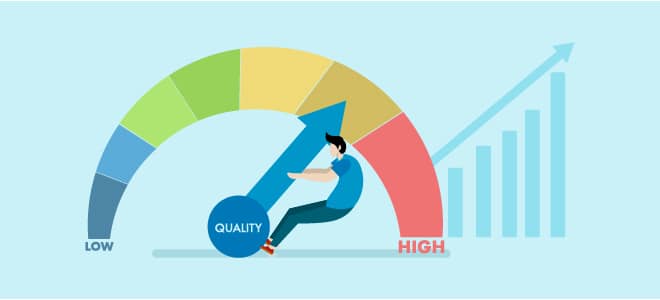Listen to this blog
In today’s competitive business climate, upholding rigorous standards is paramount to long-term success. Organizations may offer superior products and services, elevate client satisfaction, spare expenses, and boost overall productivity by implementing comprehensive quality management tools and techniques into practice. Thus, the relevance of quality has evolved into a fundamental principle across all industries and has driven up the need for qualified personnel with the ability to successfully execute quality management tools and processes.
Gaining proficiency in these methods and tools unlocks the avenues to pursue rewarding jobs and opportunities for professional advancement. An MBA in TQM (Total Quality Management) provides a holistic development and opens up various opportunities in the field. Graduates are well-equipped to steer initiatives toward enhancing quality, guide cross-functional teams, and foster overarching organizational excellence. Acquiring an in-depth knowledge of quality management practices through specialized training offers various lucrative career opportunities in a continually shifting job market.
Also read: Why choose an MBA in Total Quality Management?
Importance of quality management
Any organization aiming to deliver exceptional services and products while establishing a revered brand must prioritize quality management. Application of TQM in business leads to the below-listed upsides.
- Enhanced product or service quality:
Organizations can identify and address breakdowns or flaws right away via stringent quality control procedures, eliminating issues in the finished product. Companies may foster trust and loyalty by continually exceeding customer expectations, which will promote repeat business and favorable word-of-mouth recommendations.
- Increased efficiency and cost savings:
Quality management provides efficiency by optimizing operations, eliminating waste, and cutting down on slips. It is more economical to fix flaws and address consumer complaints when products and services are superior from the outset. Furthermore, smoother operations spurred on by productive procedures free up time and resources to ensure the organization can zero in on innovation and expansion.
- Regulatory compliance and risk mitigation:
Quality management assures adherence to pertinent standards and rules for industries governed by regulatory regulations. Organizations that perpetually comply with these criteria avoid the legal and financial consequences of non-compliance. Furthermore, organizations can lower the risks of product recalls, liability lawsuits, and impairment to their brand’s reputation by proactively detecting and addressing any quality issues.
Also read: What can I do with an MBA in Total Quality Management?
Effective tools and techniques in quality management
Effective tools and practices in quality management are essential to ensure the regular provision of high-quality offerings. Eight key TQM tools and techniques for MBA students are listed below, each with a brief description.
Six Sigma:
Six Sigma is a thorough and data-driven approach that strives to boost process efficiency by alleviating errors and variances. A defect prevalence of 3.4 parts per million (PPM) or less is normally the aim, with the emphasis being on obtaining a high level of process capability. The methodology uses the DMAIC (Define, Measure, Analyze, Improve, Control) paradigm to discover challenges, gauge process performance, dig into the causes, place solutions into place, and set up controls. Six Sigma equips businesses with the tools they need to make data-driven decisions that raise productivity, cut down on waste, and raise customer satisfaction.
Pareto Analysis:
The Pareto principle, frequently referred to as the 80/20 rule, asserts that a sizable fraction of issues are frequently brought on by a small number of underlying factors. A Pareto chart, which graphically displays the frequency or impact of numerous issues in descending order, is created as part of the Pareto analysis process. Organizations may effectively manage resources and address the core reasons causing the most profound impact on quality by emphasizing the most crucial components, which may culminate in significant improvements.
Root Cause Analysis (RCA):
RCA is a methodical process for uncovering the root causes of issues or flaws. It entails continually asking “why” to find the root of crises. Organizations can prevent reoccurring issues and improve the product’s quality and process productivity by targeting fundamental roots rather than merely symptoms. Techniques, including the 5 Whys, Fishbone Diagrams, and Fault Tree Analysis, are examples of RCA approaches.
Kaizen:
The Japanese concept of kaizen emphasizes the ongoing development of systems, goods, and services. It encourages employees across all ranks to routinely find and put into practice minor incremental modifications. This tenet fosters an environment of ongoing learning and provides teams with the autonomy to take responsibility for quality enhancement. These subtle modifications build up into substantial positive outcomes over time, enhancing productivity and client satisfaction.
Control Charts:
Control charts, commonly referred to as Shewhart charts/process-behavior charts, are visual aids for tracking the efficacy of processes over time. These graphs show data points paired with the upper and lower control boundaries generated from prior data. New data points that deviate from these bounds or display particular patterns indicate potential modifications in the process. Control charts assist organizations in identifying irregularities early, allowing for prompt corrective action and process stability maintenance.
Fishbone Diagram (Ishikawa Diagram):
This is a visual tool for investigating probable factors that could potentially be driving a particular issue or effect. The illustration mimics the skeleton of a fish, with the “head” standing in for the problem and the “bones” standing in for other groups of probable causes, including people, processes, tools, the environment, and materials. This method promotes team problem-solving and brainstorming while facilitating an in-depth analysis of all potential variables influencing quality.
Statistical Process Control (SPC):
SPC is a collection of statistical approaches utilized to monitor and regulate processes to ensure they adhere to predetermined bounds. SPC assists in identifying trends, variations, and irregularities that could result in flaws or non-conformance by gathering and analyzing real-time data while a process is being carried out. Employing SPC enables businesses for proactive measures to combat process deviations and resolve quality concerns before they escalate.
Quality Function Deployment (QFD):
QFD is an organized approach for translating customer demands and requirements into particular technical details and design elements. It makes sure that the finished good or service meets customers’ needs by establishing a matrix that matches consumer expectations with organizational capabilities. QFD promotes cross-functional cooperation and customer attention during the development process leading to products that precisely satisfy customer needs and display higher levels of quality.
Also read: What will you learn in an MBA in Total Quality Management?
Master key quality management tools and techniques with an MBA in Total Quality Management
The pursuit of an MBA in Total Quality Management (TQM) provides a transformative learning opportunity while offering learners a broad range of quality management tools and practices. Students explore the foundational ideas of TQM throughout the curriculum, comprehending its importance to accomplish operational excellence and client fulfillment. The curriculum places considerable value on thorough instruction in several quality improvement approaches, including Six Sigma, Kaizen, and Total Productive Maintenance (TPM).
The tools of statistical analysis and data-driven decision-making are additionally presented to participants, allowing them to recognize process disparities and make data-supported adaptations. Additionally, the MBA in TQM places a strong emphasis on change management abilities, preparing graduates to successfully lead quality projects and support a culture of constant enhancement. The program also promotes practical application via real-world scenarios and case studies, giving participants a chance to refine their execution skills for quality management initiatives.
Also read: Top 10 reasons to choose an online MBA in Total Quality Management
Pursue an online MBA in Total Quality Management from the prestigious Manipal University Jaipur
The acclaimed Manipal University Jaipur (MUJ) delivers an online MBA in TQM (Total Quality Management) through Online Manipal for driven individuals seeking careers in the domains of quality management. Participants acquire a comprehensive grasp of TQM principles, enabling them to boost organizational effectiveness, raise customer satisfaction, and gain an edge over their peers.
Flexibility, an industry-focused curriculum, and the globally acknowledged MUJ certification are among the program’s primary perks, all of which substantially expand career possibilities. Students enrolling in the program will also have free access to Coursera’s courses. The university also offers flexible methods for paying fees and one can choose to use simple, cost-free EMIs or apply for various scholarships.
Also read: Top careers in quality management in India and abroad
Program duration: 24 months – 4 semesters (Maximum duration 4 years)
Program fee: INR 1, 66,000 (INR 41,500 per semester)
EMI options: Starting at INR 6,917 per monthg
The following are some essential Quality Management concepts you’ll learn in the MBA in TQM:
- TQM tools and techniques
- Understanding ISO 9001
- Managing quality in the organization
- Quality Standards and Models
- Quality concepts tasks and development
- Foundation of Quality Management
- Quality in Service Industries
- Statistical Process Control
Program eligibility:
- Candidates should have a 10+2+3-year bachelor’s degree from an accredited institution or a degree of comparable level acknowledged by the AIU (Association of Indian Universities).
- Candidates need to have at least 50% overall aggregate in their undergraduate degree program (45% for reserved categories).
- Candidates are required to clear the online aptitude test administered by MUJ as per the application procedure.
- Candidates who have passed any aptitude examination (CAT/MAT/CMAT/XAT/GMAT) with an acceptable score (40 percentile) need not take the aforementioned exam.
Conclusion
An organization’s success or failure heavily relies on its standard of quality, delivering the highest quality products to customers while cutting production costs and waste at the same time. The management of a corporation is also responsible for waste control, quality management, and assurance of quality. Total Quality Management is becoming more and more significant in direction and every organization will place more emphasis on quality control and management in the future. Individuals can seize new chances by earning an online MBA in Total Quality Management from MUJ.
Prepare for your next career milestone with us












